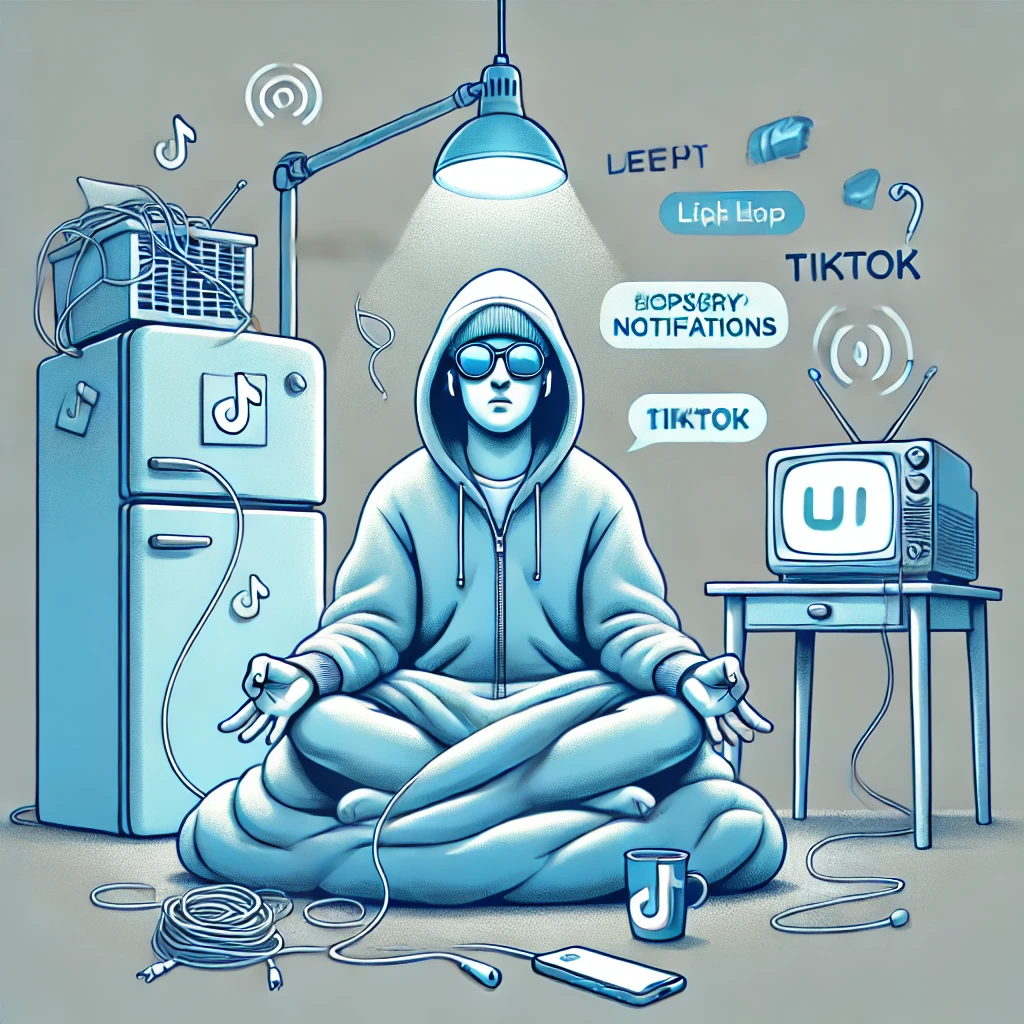I was trying to contemplate the nature of existence, but then the fridge made that noise again and my soul left my body.
There’s this famous little line—“Cogito, ergo sum.”
“I think, therefore I am.”
Great. Sounds simple. Clean. Elegant.
It is also clearly written by someone who wasn’t being dive-bombed by a fluorescent light while wondering if they left the oven on.
If you’re neurodivergent, you might know exactly what I mean.
Your body is trying to alert you to seventeen things at once, your brain is running a simulation of your latest social interactions at 2x speed, and a rogue high-pitched hum from the lightbulb is now the only thing you can hear. But sure, René—let’s sit down and think.
Descartes did his thinking in bed
While I’m dodging sensory warfare, Descartes was tucked under a duvet in a rented castle, doing philosophy from the comfort of his pillows. Maybe a glass of wine?
The original thought experiment assumes silence, solitude, and maybe some aesthetically pleasing fog. While I’m working with a lightbulb that hums like it’s auditioning for a solo in an electrical opera.
Thinking is great—when the body allows it. Otherwise it’s mostly just f-ing exhausting.
For a lot of neurodivergent folks, the body is not a peaceful vessel of spirit. It’s an ongoing sensory negotiation.
And it doesn’t help that the world seems built to keep us distracted. In that sense the experience might actually be pretty similar to the neurotypical amongst us.
It’s not just internal chaos—it’s external, too. Noise. Notifications. Sensory overload as a lifestyle. Staying tucked under your covers might not have a similar effect on your philosophical progress these days, when the lure of your instagram feed is simply too big to ignore (and where’s that wine?!). Modern life isn’t exactly optimized for quiet introspection or existential clarity. We’re all swimming upstream just to hear ourselves think… assuming we still can.
And now AI’s doing half our thinking for us. Which would be fine… if it didn’t also come with 12 notifications, 3 trackers, and a TikTok voice telling us how to boil an egg. We’ve made tools to think for us, and ended up more distracted than ever.
Don’t get me wrong. I use AI too and I love it! (and I have the paid version)
The body wasn’t supposed to matter – but it won’t shut up
Traditional philosophy loves to separate mind and body. But ND experience laughs in the face of Cartesian dualism.
Or flinches at it. Loudly.
I turns out that the body actually matters a lot.
Interoception issues? Can’t tell if you’re hungry or sad.
Alexithymia? Unsure if you’re feeling dread or excitement or both.
Sensory overwhelm? Can’t even reach your thoughts unless you squeeze you eyes shut tight to be able to block out the world and sift through all the threads in your head, to find that one thread that is related to what you’re actually trying to focus on. Or coherent. Or until the tag in your shirt stops scratching your soul.
We are not disembodied minds pondering the universe.
We are haunted Roombas navigating input chaos while occasionally thinking very deep thoughts about spacetime and death.
Thinking ≠ Being (especially when dissociating)
Here’s the thing: when the body is overwhelming, we tend to live in our heads. It’s a survival strategy. And probably not the intention. But when we do that long enough, we start to disconnect from being altogether.
Suddenly you’re a ghost in a meat suit, scrolling Wikipedia at 3am, not entirely sure what day it is, but deeply informed about cephalopod intelligence.
So… do we exist more when we’re thinking? Or less?
Rewriting the Definition of “Am”
Maybe “I think, therefore I am” isn’t the whole story. Maybe it’s more like:
• “I notice, therefore I glitch.”
• “I flinch at the fridge hum, therefore I feel.”
• “I think, but only after I stim, drink tea and put in my earplugs, therefore I might be.”
There’s something beautiful about not reducing existence to thought, says the one who can’t stop thinking.
Being isn’t just what happens in the mind. It’s the whole soup—the thoughts, the sensations, the discomfort, the laughter, the weird body feelings, the tiny flashes of awe when a thought cuts through the static like lightning.
So… What do we do with this?
If thinking doesn’t always feel like “being,” and if sensory chaos keeps hijacking your existence, then maybe the answer isn’t to think harder.
Maybe it’s to allow. Allow yourself to not think. To stim. To pace. To line up snacks by texture. To dim the lights in the room or put on your sunglasses. To make your space actually comfortable before trying to be philosophical in it. For some of us, being isn’t found in lofty thoughts – it’s in the quiet, repetitive, soothing acts that let our nervous systems exhale.
There’s no gold star for becoming a floating brain. You exist just as much when you’re sorting puzzle pieces while vibing in your favourite hoodie.
So basically.. Just be..
And then you might be able to think.


Leave a Reply